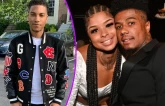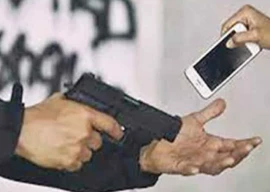
The walls in Sindh Industrial Trade Estate (SITE), where the city’s major industrial outlets are located, are aflame with threats. They might not be addressed to anyone in particular but people in the area have an implicit understanding of where the anger is directed.
“These warnings are for the business community that owns the factories in the area,” said Abdur Rasheed Solangi, managing director of SITE Limited.
Solangi said it was a clear message for industrialists and businessmen. “They either have to pay up [to extortionists] or face the consequences,” he explained.
SITE Limited was established by the government in an effort to promote industrial growth. Comprising 1,928 industrial units, SITE is considered among the most productive industrial areas in the country. It is spread over 4,460 acres and is divided into 2,646 plots. There are cotton textile mills, pharmaceutical, plastic and edible oil factories.
Many industrialists have received threatening phone calls and letters from gangs and politicians alike. They all want the same thing: money and jobs.
“Every third day you receive a call from an unknown number or a local politician, asking for extortion money or a job for their relatives and party workers,” said Naeem Ahmad, a manager in an industrial unit.
Sometimes the extortionists go as far as threatening to set their factories on fire or kidnap their children.
For Solangi, though, it is regrettable that these industrialists did not meet him before they went and complained to higher officials such as the chief minister. “I guess they just don’t trust us in the matter,” he said.
The threats are not limited to big industrialists. Even the residential areas are harassed by “party workers and members of religious groups”, said Muhammad Ismail, a wholesale dealer in SITE-B.
Humayun Khan, who manages the affairs of a small industrial unit in the area, said that the owner of the factory where he works was threatened and forced to pay Rs100,000. “But once you pay the money the extortionists keep demanding more and more,” he said. “I told my boss not to pay the money but he was so terrified that he went ahead with it,” narrated Khan. Of course, if he had received a blood-stained letter, he might have done the same thing, he admitted.
Khan said that political parties often force them to find jobs for their party activists and others. He, however, has not been approached for extortion money by any political party. “It is usually the [criminal] gangs who do these things,” he said.
The identity of the extortionists is no secret. Everyone in the businessmen community knows who they are but no one is willing, or brave enough, to share the information with the police.
Khan said the reason for this was the traders’ belief in police inefficiency. “If they were sure that the police would take action against them [extortionists], the traders would share information,” he said, adding that everyone was petrified of what the gangs might do if angered.
Police intelligence reports claim that criminal gangs, political parties and some religious outfits are involved in extortion. “In most cases, businessmen hesitate to disclose the identity of the extortionists and that’s why we fail,” a senior police official said.
The police admitted that businessmen do not have faith in them or their ability to control crime, which is also why they do not bother to share information.
“We are trying to gather more information and will soon arrest the culprits with the help of the business community,” he said, adding that the traders’ support and cooperation was necessary in curbing this crime.
Chief minister promises offer little comfort
After a meeting with a delegation of businessmen, Sindh Chief Minister Qaim Ali Shah asked the city police to provide security to industrialists and businessmen and to take action against extortionists.
He had also directed that police should be deployed in the area. However, businessmen have little hope this will change anything. “Let’s hope for the best but mere promises will not do much,” said a member of the delegation. “Practical steps should be taken. Every government has made promises but none has stood up to its word,” he added.
Published in The Express Tribune, October 10th, 2010.

















COMMENTS (2)
Comments are moderated and generally will be posted if they are on-topic and not abusive.
For more information, please see our Comments FAQ